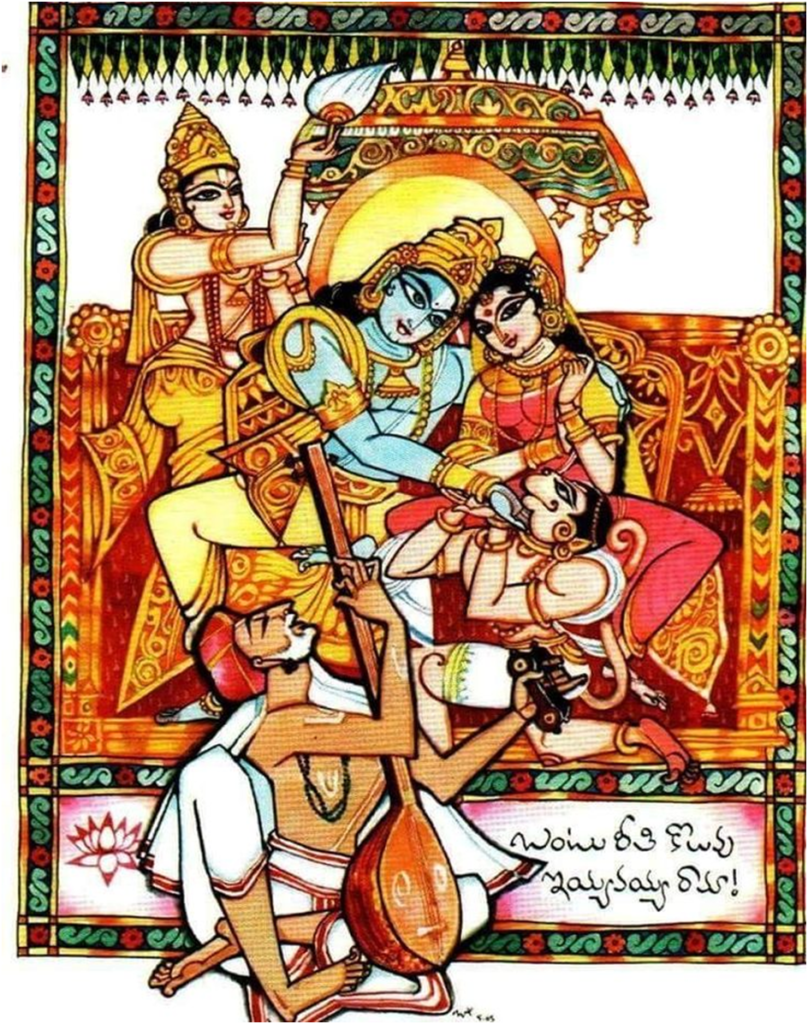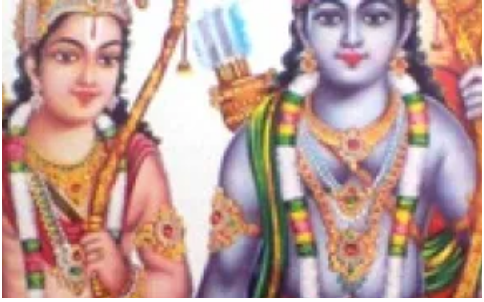29. Thiruppavai Stories

After killing Ravan in a fierce battle, Ram returns to Ayodhya and takes over the reins of administration as a King. He asks Lakshman to take the power as prince and become Yuvraj. He refuses. Lakshman repeatedly refuses the requests of Ram to share the power with Him. Lakshman says, I came with you to forests for 14 years just to serve you. I cannot live without you. I always desire to be with you. That’s is my treasure, please brother do not deprive me of that wealth. Except you I do not want anything. I perform my duty to make you comfortable and happy.
Also read: Krishna a cowherd, Is He Paramatma?
Lakshman does not obey the order of Ram. It appears as if he is not obedient. He considers every other thing as an impediment to his service to God. Hanuman also asks for the service like a servant as boon to serve Him. Naada Yogi Tyagaraju in one of his great devotional songs, asks Rama to give him the duty to perform like a ‘bantu’ – servant.
Bharath listens to the order of Ram and simply accepts to become Yuv Raj. For him obeying his elder brother’s order is important. Only once he will not obey his brother, i.e., when He orders him take the Kingdom. This is one way of devotion. Both Lakshman and Ram are devotees from different perspectives.
Like Lakshman, Gopikas and Goda have no desire to possess physical or material things. They want the association with Lord Krishna.
Also read: You know all, we know nothing
Originally the Vratam begins for rains. MargaShirsha bath is an important ritual in this Vrata. They desired bathing just to have close association with Krishna. In the first pashuram, Narayana was set as the goal and strong desire to reach Him was expressed alongwiththe demand for Parai, a drum like music instrument. The Gopikas wanted such drum. Jeeyar says Krisha is fond of butter and for the sake of butter he performs GhataNritya – dance, keeping seven pots on head, holding some more pots in two hands, with a drum arranged around waist. That Parai they are asking for. They value the Parai because it is so attached to Him with a butter story behind.
Next step is to develop association with persons nearer to God, is to follow certain principles and restrictions, as ordained by elders, receive initiation from Acharyas, understand the Mantra and meditateupon its meaning, before reaching God, first convince the divine Mother to recommend, then, tell Him that they sincerely are craving for His association and nothing else, try to attain Knowledge of self and liberation. They seek those peculiar ornaments which philosophically make you immortal, and through the landmarks of these steps complete the journey to reach Him. This is explained up to 27 pashurams. Thus, Goda tells us what we are expected to ask from the Bhagawan.
Also read: Why Goda wanted this Sri Vrata- Tiruppavai
God Himself is the means, and Gopikas have nothing of their own. These are the two principal rules of faith explained in 28thand 29th songs. In 28ththey say Krishna is the means. In the first song, they say Narayana would give Parai, but in 28th song Goda says we deserve to get His association. 30th song concludes with the VrataPhalam, the fruits of efforts. First, they say Narayana give Phalam, and in the last they say Narayana Himself is the Phalam. They sought Conch,Sankham, which is very close and always filled with the air from the mouth of Krishna.
Goda is taking the Gopikas, you and me, through steps gradually leading us to Saayujya, for final union with Supreme Soul. Ultimately, they have spelt out their desire to be with Him for seven generations.If every time Krishna descends again in any Avathara, they want to be bound by some relation with Him.
They attained purity by avoiding impuritieslike (1) Thinking of means other than God, (2) Seeking something else rather than God and (3) Serving God for one’s own reason. Seeking God as a means is a purification, which is called ‘purification of means’ (UpaayaShuddhi) as rendered in Song 28.
Also read: Why Gopikas Ask for Conch of Krishna
This pashuram reflects the Tirumantra – eight-lettered mantra,Ashthaakhari. Guru Acharyas desired no rebirth. But Goda said give us births but let us be your associates. For us, taking birth along with you as your relative is better than the Moksha.

Also read: Devaki and Yashoda are two Divine Mantras




